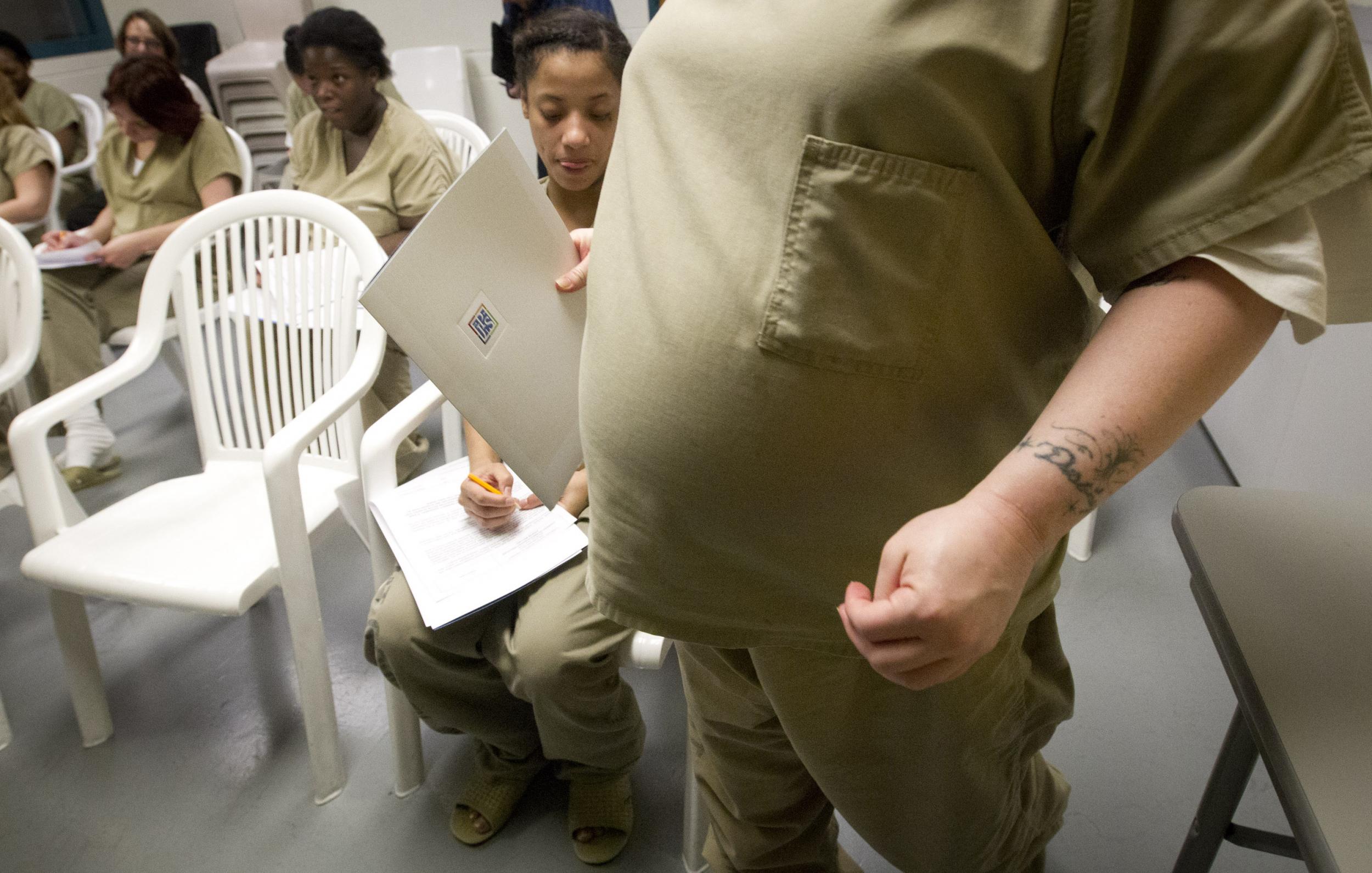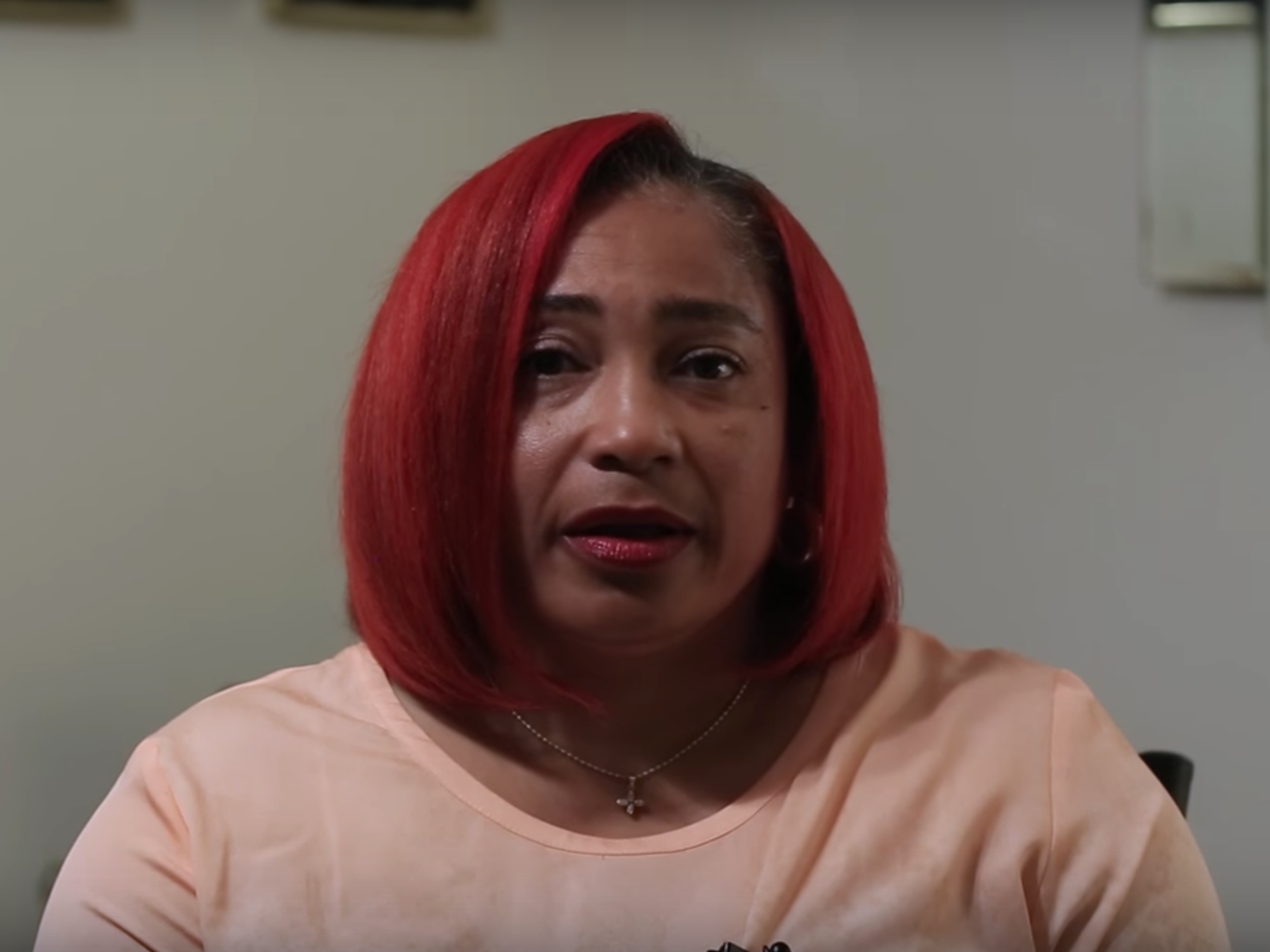'They threw my baby in the trash': Majority of women in US House unite on bill protecting pregnant prisoners from 'shameful' conditions
Exclusive: 'How we treat people when they are incarcerated is shameful to our country,' Representative Karen Bass says

Of all of the heartbreaking things that have happened to Pamela Winn in her lifetime, nothing compares to the moment she learned she had lost her baby while haemorrhaging in a jail cell in Clayton County, Georgia.
“I’m laying there, I’m bleeding, I’m shackled to a bed, I’ve got these two men down between my legs that I don’t know from Adam, and they’re there saying that they threw my baby in the trash,” she told The Independent of the moment, more than 10 years ago, when the doctors told her she had miscarried. “It’s not something I will ever forget. Ever.”
It’s exactly the kind of experience Representatives Karen Bass and Mia Love are hoping to prevent from ever happening again. Their new bill, the Pregnant Women in Custody Act, aims to provide a national standard of care for pregnant prisoners by requiring access to pre- and post-natal care in detention facilities, and mandating training for all correctional staff.
The bill, which they introduced on Thursday in the House, would also put a nationwide ban on the shackling and solitary confinement of pregnant prisoners.
“I thought it was despicable, frankly, that this is the United States in 2018 and ... we still carry out such a barbaric practice,” Ms Bass told The Independent.
She added: “It’s bad enough that we have the largest prison population in the world, but how we treat people when they are incarcerated is shameful to our country.”

Ms Winn – who says her mother was in and out of jail throughout her childhood, and who was the first person in her family to graduate high school, much much less college – was indicted in 2003 on 20 counts of healthcare fraud. It was only during her intake evaluation at Robert A Deyton Detention Facility in 2008 that she learned she was six weeks pregnant.
Ms Winn says the facility provided her no extra medical care or nutrition during the first weeks of her incarceration. In fact, they continued to shackle her in arm and leg cuffs when transporting her back and forth to court hearings – a practice condemned by both the American College of Obstetricians and Gynaecologists and the American Psychological Association.
On one of those trips, Ms Winn says, she tried to step into the van but missed, as her legs were constrained by the iron cuffs. She fell hard, unable to catch herself because her arms were shackled, too. That night, she started bleeding into her underwear.
Ms Winn says it took days to get a prison doctor to check on the bleeding, and a total of twelve weeks to get her requests approved to visit to an outside doctor, obstetrician, and ultrasound technician.
A spokesman for the GEO Group, which runs the facility, said a search of records from that time period did not turn up any grievances or complaints. The US Marshals office did not respond to requests for comment.
One night, while waiting for approval on yet another request to see her ultrasound results, Ms Winn says she felt a rush of blood coming from her vagina. Then came the cramps – a pulsing pain in her uterus that made her cry out for help.
By the time medical personnel arrived, it was too late. When she finally arrived at the hospital, the doctor informed her that she had miscarried while in her prison cell. When she asked the prison guards for her sheets, they said they had thrown them away. Her foetus had been thrown in the trash.
“That had to be my lowest point ever, just to hear that the child was thrown in the trash can,” Ms Winn said. “My baby, something that was a part of me, just discarded like trash … I just felt empty inside.”
It is unclear how many pregnant women are currently incarcerated, but it’s estimated that approximately 2,000 women give birth in custody each year. The number of women in prison has soared in recent years, due to an increase in drug sentences and – in some cases – an inability to make bail. Between 1980 and 2016, the number of incarcerated women increased by more than 700 per cent, according to the Bureau of Justice Statistics.
Ms Bass said she heard numerous stories like Ms Winn’s while working for the Community Coalition – an organisation she founded in Los Angeles in 1989 to combat mass incarceration and the war on drugs. She became increasingly convinced of the need to protect pregnant inmates after joining Congress, where she observed first-hand the kinds of criminal justice reform bills that were being discussed.
“What I noticed right away was when members were talking about it, they were not saying anything specific to gender,” she said. “The needs of women who are incarcerated – and in the criminal justice system in general – are not being addressed.”

There are currently no state or federal laws limiting the restrictive housing of pregnant prisoners, according to a review by the National Women’s Law Centre. Twenty-two states either explicitly allow the use of leg irons or waist chains on pregnant inmates, or have no policy on them at all. Forty-three states do not require medical examinations as part of prenatal care, and 48 states do not offer pregnant prisoners screening for HIV.
The Bureau of Prisons (BOP) handbook states that inmates who are pregnant, in labour, or receiving post-natal care should not be placed in restraints unless they pose an “immediate, serious threat” to themselves or others. Wardens, the handbook adds, are responsible for providing each pregnant inmate with medical and counselling services, as well as a social worker and case manager.
The BOP said in a statement that they are "committed to ensuring the safety of all staff and inmates in our facilities through a controlled environment that is secure and humane".
"The BOP provides programmes and services that address the unique needs of female offenders, including pregnant inmates," the statement said. The bureau also pointed to their policies on the use of restraints, and the requirement that all staff at female facilities complete training on how to work with female offenders.
But Ms Bass said these policies are often disregarded, or only loosely followed. She spoke of one pregnant woman she met who had asked for supplemental nutrition and was given a single extra peanut butter and jelly sandwich per day.
“If women are given peanut butter and jelly sandwiches and that’s considered additional nutrition, what we are doing now – regardless of what the handbook says – is not adequate,” she said.

According to an advance copy viewed by The Independent, Ms Bass and Ms Love’s bill would prohibit the use of restraints and restrictive housing on prisoners who are pregnant, or who have given birth within the last eight weeks – with exceptions for inmates who are likely to escape or physically harm themselves.
The bill would also establish minimum standards of care for pregnant women, foetuses, and newborns in federal custody, and require the Department of Justice to develop training programmes and guidelines for federal correctional officers.
Finally, it would require the Justice Department to collect data on the mental and physical health of pregnant women in custody, and establish a Government Accountability Office (GAO) study to of services and protections for pregnant prisoners in local and state facilities.
Ms Bass, a Democrat, and Ms Love, a Republican, have amassed a bipartisan group of more than 50 congresswomen to support the legislation, which they hope will usher it through to party leadership. While the bipartisan process means some issues were left out – namely, the treatment of women in Immigration and Customs Enforcement (ICE) custody – Ms Bass said the dual party support should help the legislation pass swiftly.
A group of Democratic senators introduced similar legislation in the upper chamber last year, which would have banned the shackling and solitary confinement of pregnant women, among other things. The bill stalled in the Judiciary Committee, but resulted in the Bureau of Prisons agreeing to provide free menstrual products, and several states introducing laws to that effect.
Ms Winn, who consulted on the current legislation as well as the Senate bill, said she is thrilled the issue is getting national attention. She emphasised the importance of data collection on pregnant inmates, which is currently spotty and difficult to access. The biggest threat to pregnant prisoners, she said, is that they are simply ignored.
“Who knows how many women are in there, and may be going through something worse than what I went through, and nobody even knows they’re there,” she said.
Join our commenting forum
Join thought-provoking conversations, follow other Independent readers and see their replies
Comments
Bookmark popover
Removed from bookmarks